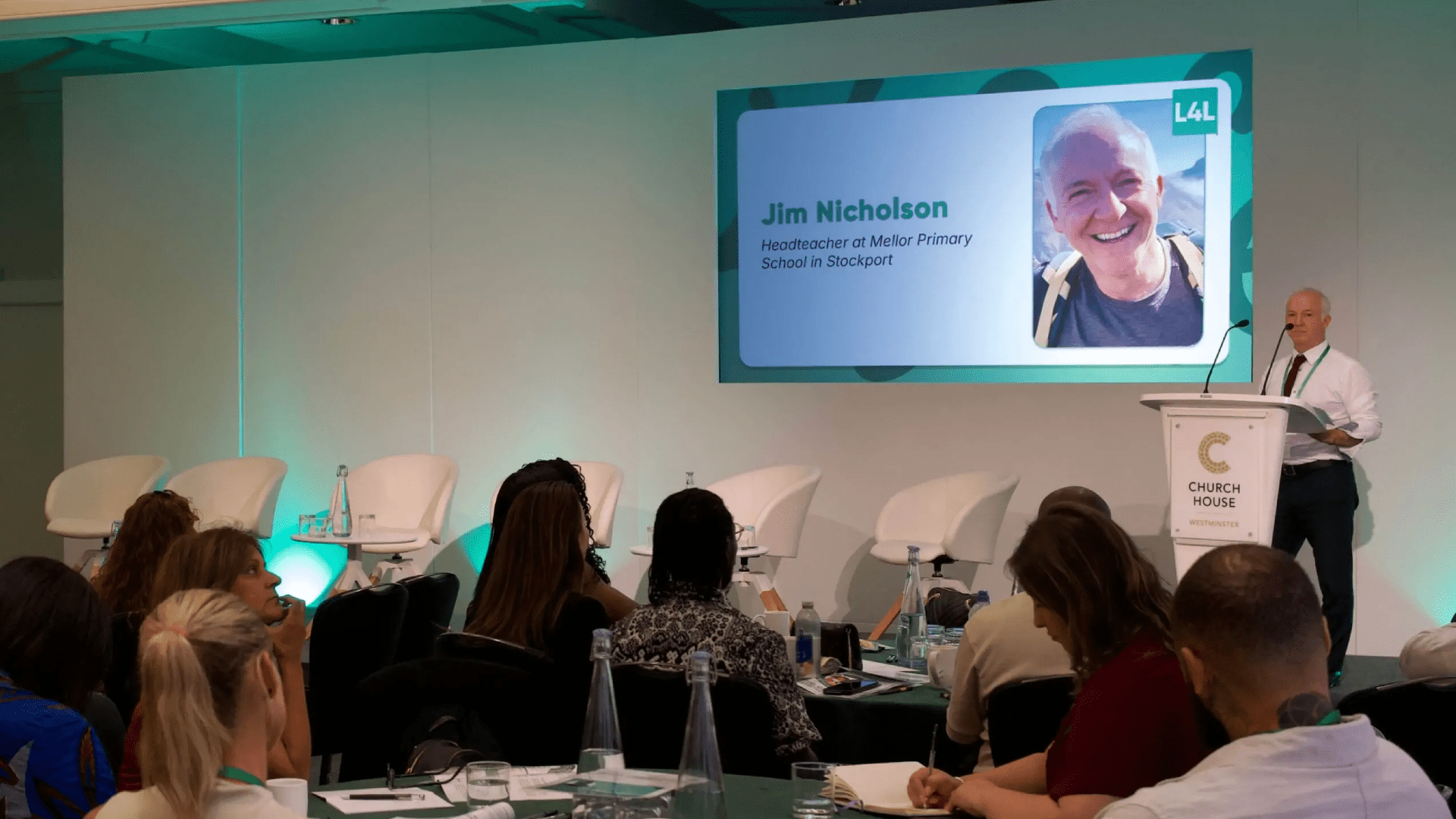We caught up with Teresa Skeggs, Executive Headteacher of Peartree Spring and Featherstone Wood primary schools in Stevenage, to discuss the Lessons4Life campaign and approach to personal development in her schools.
Teresa, what is it about the Lessons4Life campaign that especially resonates with you, and is particularly important as a school leader?
“It is genuinely difficult to pick out just one thing, but what resonates most with me about the Lessons4Life campaign is its focus on developing well-rounded, resilient children – especially in communities like ours in Stevenage, where some children face deprivation, low expectations, and exposure to challenges such as gang culture and knife crime. Their aspirations can, and should, be much higher, and this is something I passionately share with both children and parents. As a school leader, I see first-hand how vital it is to teach children life skills, build trusted relationships, and help them believe that their circumstances do not define their futures. It is about showing children they can be that really good person, that they can get the job they want, and that nothing is therefore unobtainable. We should not misinterpret this campaign as being aimed at secondary school children because there are children in years 5 and 6 who are really familiar with issues such as knife crime and seeing things online that really they should not, and we need to take children out of that and re-write the narrative. Being a well-rounded child means you will inevitably become a well-rounded adult. Education is important but it is not all about year 6 and passing SATs, it is about all those different things that life entails. The campaign supports this mission. It is about equipping children for life, not just exams – and that aligns deeply with my own ethos.”
With the updated statutory RSHE guidance in July 2025, how do you think that may impact the changes advocated by Lessons4Life?
“Firstly, I would say the updated guidance probably does not go far enough. As with many government policy initiatives, whilst this may set a foundation, it can feel tokenistic and lack relevance to local context. What we have to look at is how that guidance really affects children in our care. Yes, in theory they should be learning about X, Y, Z, but we have to make sure there is a point to it and give it the credence it deserves. I support Lessons4Life’s push for PSHE to be taken seriously – not treated as a cover lesson, which it can be – and I strongly believe the guidance is only useful if schools give PSHE proper time, intent and implementation within the broader curriculum. At Peartree Spring and Featherstone Wood primary schools, we have ever-evolving personal development plans and these take a mixture of statutory guidance and areas such as rights respecting and British citizenship. I have recently re-written our Personal Development Plan for 2025-26, as we have a unique set-up that includes an autism school and a specialist behaviour service, and some of our behaviour-focused pupils come with complex knowledge and experiences that we need to address carefully. We want the plan to be personal to use, but also give us a more secure starting point, drawing on a mixture of resources and blending them to suit the needs of our children.”
On the campaign asks, what do you think has the potential to generate the biggest ‘cut through’?
“Funding is one, but it is also about system change. I sometimes find it really frustrating that all the hard work we do in primary school – building strong relationships, using resilience programs, offering emotional support through school family workers and worry boxes – can be undone when the children move on to secondary school. It is not that secondary schools are failing; they are just overwhelmed. But it is disheartening when a child we knew and supported ends up involved in gangs or violence – young people who were never even on our radar for that kind of behaviour. Children want everything instantly, and some see gang life as a fast track to wealth, not understanding the real risk of this dangerous behaviour. Education is the answer, but our system is so archaic that there has not been a place for those unless you are in a PRU or education support centre. Even then, the vast majority of children in those settings find difficulty in completing basic reading and writing skills or they say they are too cool to pick up a book. Children are getting older and older, younger and younger. We have had to stop Year 4 children from walking home alone – and one of the reasons for this is it means they do not have to have a phone on them. Parents often push back, wanting their children to have phones, but they may not see the danger in the bullying on WhatsApp groups, which is really prevalent even in primary school. And the biggest threat children can face is actually in their rooms at home.”
There is definitely a lot of tackle. In terms of the curriculum, how do you know your approach to personal development is working?
“If you want a hard measure, I have only had to permanently exclude one child since 2009, which reflects how I run my schools. We also buck the trend nationally as exclusions tend to be white British boys. Behaviour across our schools is renowned for being very good – there is a healthy respect from both children and parents. I stick to our policies firmly because they are in place for the good of everyone, and do not back down if I think we are correct. You do not walk around our schools and see disruptive behaviour or low-level disruption. When disruption does happen, it is usually because a child has not necessarily been placed in the right provision but even then they are catered for and look after. We have clear, effective systems and processes in place that genuinely work. For behaviour, we also use tools like Boxall profiles and Thrive, though not typically for neurotypical children. If another school leader asked me for advice on building confident, well-behaved pupils, I would say it is about consistency, strong systems, and a clear understanding of what we stand for. We teach children to be able to express themselves, but doing it in a respectful way so that you do not upset and offend somebody else. Children should be allowed to take risks and make mistakes, but they need to be supported to learn from that.”
Might we see a response to this in the Curriculum and Assessment Review?
“To be honest, I do think the curriculum needs an overhaul, but it is tough because every subject has someone defending it. Someone may say ‘drop Design Technology’ – no-one wants to teach it or lead it. But then again, an engineer would argue that is essential, so it is not straightforward. However, time in the curriculum is definitely an issue. Maybe we need to rethink how we deliver subjects – perhaps a faculty-style approach where skills are embedded across broader areas, rather than treated as isolated disciplines. I even joke about getting rid of algebra; I have never used it since school. But then, what do you take out without taking away the one thing a child might excel at? We also need to think about children who are always feeling they are behind. Could we create more bespoke pathways? By Year 6, most children should be grounded in the basics – reading, writing, communication. After that, we should be extending these skills and teaching essential life skills. Do children really need to know all the grammar rules or the properties of equilateral triangles? Probably not – but they should definitely be able to read an analogue clock. The point is, if children are genuinely interested in something, they will often pursue it on their own anyway. But whatever changes we make, we will always face resistance. Still, the system needs to change – it just has to be done thoughtfully, without a one-size-fits-all approach.”
If you were speaking to the Secretary of State for Education about Lessons4Life, what would your message be?
“What worries me most is children’s exposure to social media. As a school, I know it is part of our role to guide and educate them, but on seeing things it is how we put it back in the bottle and get on top of that. Even at primary level, social media has a huge impact. It is honestly one of our biggest concerns. I have started thinking seriously about whether we should ever allow mobile phones in schools at all. Some schools use those locked pouches, but in my schools, it is an onerous staff task – they all have a wallet, put them in a box, and they go down to the office, then we hand them back out at the end of the day and no phones are allowed to be out of bags on school premises. I may have banned phones in Year 4, but that does not stop apps like Roblox or Minecraft from causing issues. So many incidents we deal with start from arguments that happen online in the evenings. And realistically, there is very little I can do once it has happened outside school hours. I think the government needs to take a stronger stance on this. How much emphasis are they putting on it? Are they really prioritising children’s digital safety? We focus so much on academic outcomes – grades and exam results – but what about the children who do not even make it to their GCSEs? In our area, Year 8 is a real pressure point. They get more confident, but that also brings more challenges. Ultimately, I do not think enough is being done to tackle what young people can access online. Then we also know they lie about their ages and create new email accounts, but we still need stronger systems in place.”



